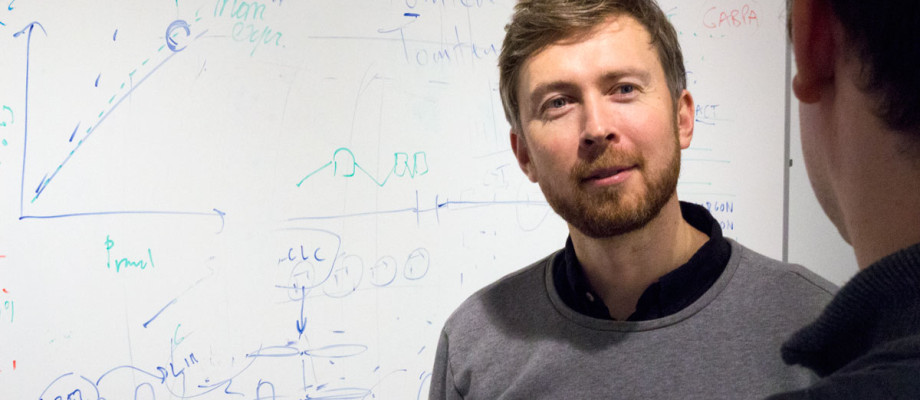GRANTS. That cancer is due to changes in DNA has been the starting point for cancer research, for the past several generations. But until quite recently, only a fraction of the human genetic material had been examined, namely the genes that encode proteins. Erik Larsson Lekholm, who was recently appointed a Wallenberg Academy Fellow, examines the other 97 percent of the genome with the help of powerful computers.
Wallenberg Academy Fellows are financed by the Knut and Alice Wallenberg Foundation. The program supports some of the most promising young researchers in all areas of research, and Erik Larsson Lekholm is one of 29 to have received grants this year. This provides him financing for five years, with the opportunity to seek additional support for another five years.
“I am genuinely grateful and it is fantastic that they believe in me and the work my group does. It is an honor, that additionally gives us new opportunities to supplement the group and further the research,” says Erik Larsson Lekholm, who celebrated with St. Lucia’s Day coffee and saffron buns.
An exploding field
The technology for large scale analyses is constantly improving and the need for bioinformatics increases along with technological development. In recent years, the research field of non-coding genetic material has exploded. Several discoveries have confirmed that RNA that does not produce proteins still plays a role during tumor development. Erik is now increasingly focusing on alterations in non-coding DNA that in turn give rise to non-coding RNA.
“There’s currently a lot of interest in the role of non-coding RNAs in cancer, but it remains unclear as to what degree DNA changes in non-coding regions are a contributing factor. Such changes are a hallmark feature of important protein-coding cancer genes, and therefore, the question is fundamentally important. Analyses of non-coding tumor DNA has the potential to link non-coding genes to tumor development in a more conclusive way, and non-coding alterations may perhaps also point to new coding genes that are important,” says Erik Larsson Lekholm.
The group works with a wide range of cancers – sometimes ten or more in the same study. Some projects are, however, focused on a single cancer disease, often in collaboration with more experimentally minded groups. They look at enormous amounts of sequencing data for genetic changes that recur in cancer cells in many patients. Among other things, they develop methods that enable differentiation of significant changes from the disruptive background noise. Essentially, cancer genomes often contain a large amount of changes that are not harmful. Certain genome sequences are more unstable than others and contain such mutations. Therefore, one aspect of the research is to try to gain an understanding of how these non-functional changes are spread throughout the genome.
Demands strong machines
The amount of data that is analyzed in this type of research is nearly incomprehensibly large. Here, Erik Lekholm Larsson’s research group benefits greatly from UPPMAX (Uppsala Multidisciplinary Center for Advanced Computational Science), a high performance computing center in Uppsala that provides calculation capacity for Swedish genome research. The groups also has its own high performance computers in a basement of one of the buildings on Medicinaregatan.
Much of the data they work with is retrieved from the cancer consortium, the Cancer Genome Atlas (TCGA) and other public sources. Sometimes the group also sequences its own material to obtain data for research.

“I would like the PhD students in my group to learn to think in terms of biological questions. Even if their tools differ from those used in the lab, it does not mean that computational work is entirely different from working in a wet-lab. But both worlds are of course needed.” says Erik Larsson Lekholm, who wants to use some of the grant from the Knut and Alice Wallenberg Foundation to hire a postdoctoral fellow who complements the group’s experimental competence.
Engineer at heart
Early on, he became interested in research and technology – including through many years of summer jobs at his father’s workplace AstraZeneca, where he serviced and built different measuring devices that were used in preclinical research. After completing an engineering education at Chalmers, he saw the chance to combine his interest in computers and biomedicine by studying for a masters in bioinformatics.
He received his research education at the Wallenberg Laboratory under the supervision of Per Lindahl. Per Lindahl’s research is distinctly experimental, and Erik spent a great deal of time in the wet-lab during this period.
After his disputation he spent several years in New York where he was a postdoctoral fellow under Chis Sander at Memorial Sloan-Kettering Cancer Center. There, he was given the opportunity, among other things, to work with Nobel Prize winner Harold Varmus’ group and collaborate with researchers at Rockefeller University that is only a stone’s throw from the cancer center.
Six new Wallenberg Academy Fellows at GU
So far, 121 young researchers have been appointed Wallenberg Academy Fellows over the four years the program has been in effect. This year, 29 new Wallenberg Academy Fellows were appointed, and six of them will conduct their research at the University of Gothenburg. Each researcher receives between SEK five and nine million, depending on their discipline. After the first period ends, the researchers have the opportunity to apply for a further five years of financing.
BY: ELIN LINDSTRÖM CLAESSEN











